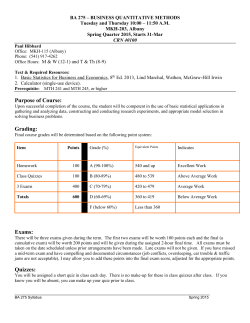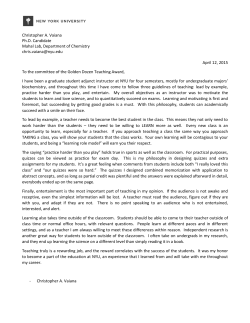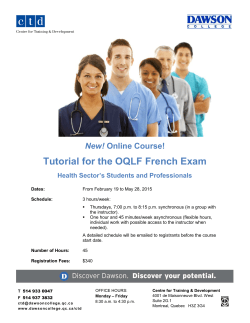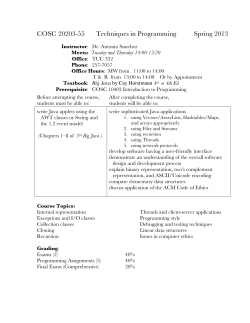
Syllabus - University of Minnesota Duluth
Math 3298 Calculus III Section 3 Syllabus – Fall 2014 Instructor: Web Page: Email: Office: Phone: Office Hours: Kate Niedzielski http://www.d.umn.edu/~jedli008 jedli008@d.umn.edu SCC 74 726-7852 Monday 1:00-1:50 Tuesday 12:00-1:50 Wednesday 11:00-12:00 Friday 9:00-9:50 or by appointment GTA: Ian McGahan Email: mcgah021@d.umn.edu Office: SCC 152 Office Hours: Monday 2-3, Wednesday 10-11, Thursday 2-3 Meeting Times: Lecture Section 3: MTWF 10:00-10:50 am in Chem 251 Lab Section 4: Th 10:00-10:50 am in KPlz 143 Prerequisites: A grade of at least C- in Math 1297 or Math 1597 Text: Calculus: Early Transcendentals, 7th ed. by James Stewart Course Content: This is the third part of a standard introduction to calculus. Conic sections, vectors and vector-valued functions, partial derivatives, multiple integrals, vector fields, Green’s and Stokes’ Theorem. Calculators: A calculator may be useful at times. However, any calculator that is capable of symbolic manipulation will not be allowed. This includes the TI-89. See the instructor if you are unsure if your calculator is acceptable. You must show your work (thought process) for all problems, thus answers arrived at by calculator alone will be granted very few, if any, points. The instructor may limit the use of a calculator (or just a graphing calculator) on some or all quizzes and exams. Sharing a calculator during a quiz or an exam will be considered cheating and result in an immediate zero. A cell phone may not be used as a calculator during quizzes or exams. Cell Phones: Cellular telephones and other communication devices are prohibited during quizzes and exams. Having any communicating device out during an exam will be considered cheating and result in an immediate zero. Also note, it is discourteous and a distraction to have ringing phones during class time. If you do not turn off your ringer you may be asked to leave the room. Homework: Homework problems and due dates will be posted on my website. Homework will be typically be due by 3:00 pm on Wednesdays unless otherwise notified. Any homework that is put in my mailbox or under my door will not be graded unless you have received my prior approval. Homework must conform to the “HOMEWORK GUIDELINES”. Your solutions must show your thought process, not just the answer. Answers without supporting work will not receive full credit. Cooperation on assignments is encouraged, but copied assignments will not be tolerated and will receive a score of zero. You may not use any source that has the solutions to the assigned evennumbered exercises. The lowest homework score will be dropped at the end of the semester. Late homework will not be accepted. Quizzes: I may schedule several quizzes during the semester to assist in evaluating your progress. Quiz points will count the same as homework points and will not be worth more than one assignment. The quizzes may cover any topic from previous homework, the text or lectures. No makeup quizzes will be allowed unless prior arrangements are made between the student and the instructor. Labs: The weekly lab component will consist of assignments using the computer software package Mathematica. Your GTA for this course will be available for help during the lab hour and during his office hours. Labs will be due to the GTA by the beginning of the next lab period. Exams: There will be three exams and one final given during the semester. Makeup exams are only allowed for a documented illness or University excused absence if prior arrangements have been made with the instructor. Unless it is not possible, you must provide notice ahead of time to your instructor for the absence. Oversleeping, poor preparation, slight colds, and cold weather are not valid excuses. Arrangements for a makeup should be made as soon as you know you will miss. Do not wait for the next class. Tentative Dates: Exam 1: Wednesday, October 8 Exam 2: Wednesday, November 5 Exam 3: Wednesday, December 3 Final Exam: Wednesday, December 17 from 10:00-11:55 am Grading: Homework Labs Exams (3) Comprehensive Final 20% 10% 45% 25% If you have questions about any of the grading, please arrange to talk with me about it within a week of its return. I will use eGradebook to keep track of your scores. There is a link on my website. Please let me know as soon as possible if you find an error. Keep all homework, quizzes, and exams as proof of your scores. Grading Scale: 93-100% A 90-92% A87-89% B+ 83-86% B 80-82% B77-79% C+ 73-76% C 70-72% C67-69% D+ 60-66% D Below 60% F Integrity Policy: Academic dishonesty is taken seriously by the University. Cheating on assignments or examinations, plagiarizing, or any other act which violates the rights of another student in academic work or that involves misrepresentation of your own work may result in a grade reduction on the assignment/quiz/test or a grade reduction in the class (including the possibility of failing the class). If a student is found responsible for academic dishonesty, a report is filed with the UMD student academic integrity officer and is considered a violation of the Student Conduct Code. The UMD Student Academic Integrity Policy can be found at http://www.d.umn.edu/vcaa/StudentAcademicIntegrity.html. The policy outlines what is considered prohibited conduct. Conduct Code: The instructor will enforce and students are expected to follow the University's Student Conduct Code (http://www.d.umn.edu/conduct/code/). Appropriate classroom conduct promotes an environment of academic achievement and integrity. Disruptive classroom behavior that substantially or repeatedly interrupts either the instructor's ability to teach, or student learning, is prohibited. Disruptive behavior includes inappropriate use of technology in the classroom. Examples include ringing cell phones, text-messaging, watching videos, playing computer games, emailing, or surfing the Internet on your computer instead of note-taking or other instructor-sanctioned activities. Students with disabilities: It is the policy and practice of the University of Minnesota Duluth to create inclusive learning environments for all students, including students with disabilities. If there are aspects of this course that result in barriers to your inclusion or your ability to meet course requirements – such as time limited exams, inaccessible web content, or the use of noncaptioned videos – please notify the instructor as soon as possible. You are also encouraged to contact the Office of Disability Resources to discuss and arrange reasonable accommodations. Please call 218-726-6130 or visit the DR website at www.d.umn.edu/access for more information. Mental Health Statement: As a student you may experience a range of issues that can cause barriers to learning, such as strained relationships, increased anxiety, alcohol/drug problems, feeling down, difficulty concentrating and/or lack of motivation. These mental health concerns or stressful events may lead to diminished academic performance or reduce a student’s ability to participate in daily activities. University of Minnesota services are available to assist you with addressing these and other concerns you may be experiencing. You can learn more about the broad range of confidential mental health services available on campus via the UMD Health Service Counseling website at http://www.d.umn.edu/hlthserv/counseling/ Tutoring Center: In addition to my office hours, help is usually available M-F at the Tutoring Center on the second floor of the library. The website is http://www.d.umn.edu/tutoring.
© Copyright 2025
















